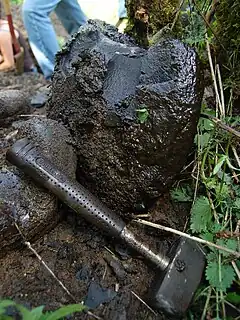Alum Shale Formation
The Alum Shale Formation (also known as alum schist and alum slate) is a formation of black shale of Middle Cambrian to Tremadocian (Lower Ordovician) in age found predominantly in southern Scandinavia.[1] It is shale or clay slate containing pyrite. Decomposition of pyrite by weathering forms sulfuric acid, which acts on potash and alumina constituents to form alum, which often occurs as efflorescences on the rock outcrop.
| Alum Shale Formation | |
|---|---|
| Stratigraphic range: Cambrian-Ordovician | |
 | |
| Type | Geological formation |
| Thickness | up to 160 m |
| Lithology | |
| Primary | Black shale |
| Other | Shale, oil shale |
| Location | |
| Country | Sweden, Denmark, Norway |
As the formation contains kerogen originated from algae, it is also classified as marinite-type oil shale. At the same time it is rich in aromatic hydrocarbon attributed to post-depositional irradiation damage to saturated hydrocarbons, induced by uranium concentration in the shale.[2] Alum shale also contains enhanced levels of radium as a result of uranium decay.[3] Between 1950 and 1989, Sweden used alum shale for the uranium production.[4]
See also
- Orsten, a lagerstätte in the Alum Shale Formation
References
- Nielsen A.T. & Schovsbo N.H. (2007). "Cambrian to basal Ordovician lithostratigraphy in southern Scandinavia" (PDF). Bulletin of the Geological Society of Denmark. 53: 82–84.
- Peters, Kenneth E.; Walters, Clifford C.; Moldowan, J. Michael (2005). The biomarker guide. Cambridge University Press. p. 777. ISBN 978-0-521-83762-0. Retrieved 2009-05-30.
- Stranden, E.; Strand, T. (1988). "Radon in an Alum Shale Rich Norwegian Area". Radiation Protection Dosimetry. Oxford University Press. 24 (1–4): 367–370. doi:10.1093/oxfordjournals.rpd.a080304.
- Dyni, John R. (2006). "Geology and resources of some world oil shale deposits. Scientific Investigations Report 2005–5294" (PDF). United States Department of the Interior, United States Geological Survey. Retrieved 2009-05-30.